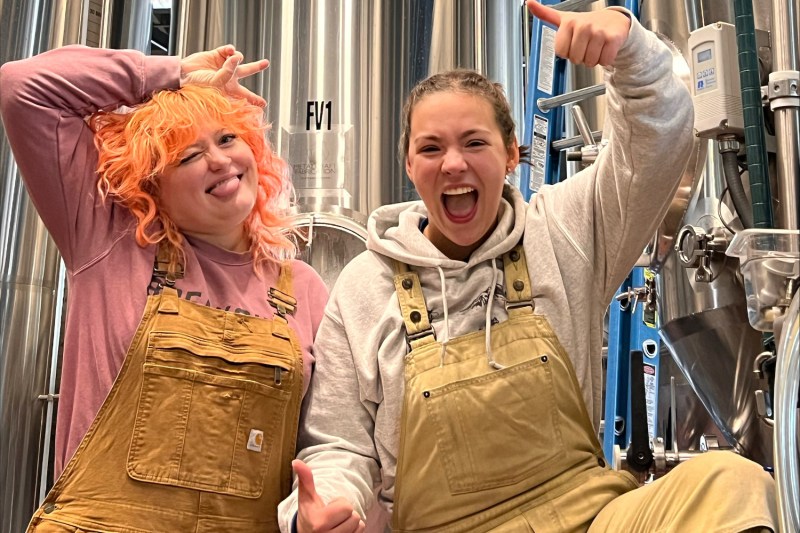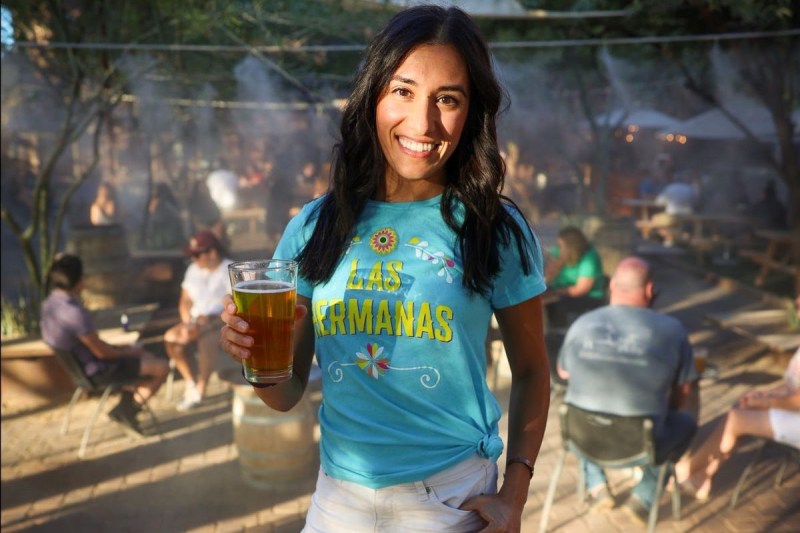Women make up more than half of the American population. In the craft beer market, the bustling realm that’s brought you everything from the cold IPA to the smoothie sour, not even 8% of head brewers are women. Thanks to hard-working groups like the Pink Boots Society (PBS), that percentage is trending upwards.
10 Barrel brewmaster Maddy McCarthy knows this well. The acclaimed female brewer, who’s known among industry friends as “Rainbow Brite,” is based in Portland. She’s a PBS member and helping to bring some much-needed diversity to the craft beer landscape.

The history of women in the craft beer industry
Years back, when McCarthy was just getting into the industry, she was invited to a fateful brew day sponsored by the organization. “I met so many talented women that day, some of [whom] have become great friends, and I’m super grateful that I was invited,” she recalls.
As McCarthy says, PBS is all about assisting, inspiring, and encouraging women and non-binary individuals in the brewing industry. The organization is led by a 10-member board and offers job listings and networking opportunities on its site. It also awards multiple scholarships, hosts events, and serves as a vital resource for women industry members. While this is helpful for those aspiring to lead labels as head brewers, PBS is an all-inclusive program covering every facet of beer, from label design and packaging to serving the beers in front-of-house roles.
PBS sent McCarthy to Europe, where she learned tons about beer and brewing. According to her, Pink Boots offers a global community built around communal growth and education.
“I received a Pink Boots scholarship last year to study brewing technology and techniques in the Netherlands and Belgium through the University of Leuven,” she says. “For two weeks, a group of us traveled up and down Belgium and parts of the Netherlands to meet with brewers, scientist[s], maltsters, and professors to learn all about the different brewing practices that are being used for Belgian beer. Without the Pink Boots scholarship, I would’ve never been exposed to all of that knowledge, culture, and experiences.”
McCarthy brings up an interesting point. In the formative days of fermentation, brewing was actually women’s work, as it was considered to be an offshoot of baking.
“From the earliest evidence of brewing in 7000 BCE until the commercialization of brewing during the Industrial Revolution, women were the primary brewers,” she says. McCarthy adds that the many deities and protectors of brewers in so many cultures are female entities closely associated with fertility. “This also ties in with the lore of witchcraft. Bubbling cauldrons, cats and broomsticks, pointy hats, magical elixirs — these all begin to make sense once you know the history of brewing.”
The scene in Portland inspires her.
“We’ve got Whitney at Grand Fir, Natalie at Wayfinder, Anna at Steeplejack, Lisa at Heater Allen/Gold Dot Beer, and myself. This all happened within a few years, and with a lot of hard work,” she says. “Everyone deserves a place at the table because beer is for everyone.”

How the Pink Boots Society has grown
Ayla Kapahi is the 32-year-old head brewer at Tucson’s Borderlands Brewing Company. When she got started, she was one of only two female brewers in Tucson; there are now more than 3o women in the craft beer world there.
Early on, the nearest PBS chapter was in San Diego, six hours away.
“Our region needed a local chapter,” she says. “Women in our region were already supporting each other professionally and personally. We were already organizing on our own and traveling to various cities for annual collaboration brew days. It just made sense to officially open a local chapter that directly benefits our women craft industry leaders. We also wanted to be part of a structured and reputable organization that could allow for better professional and networking opportunities.”
She started the local chapter in 2021 and has been an official member for seven years. She credits it with elevating the industry.
“First, and perhaps most importantly, it’s given international exposure to women in the craft beer industry,” she says. “Recognition and change for any minority group starts with exposure. Awareness is the first step. Women in the industry benefit from having a structured networking platform.”
Kapahi says PBS offers professional connections and is a platform for educational opportunities and support.
“Members can ask others for business or brewing advice,” she adds. “It’s incredible to see women supporting women. That’s what’s most rewarding.”
Meanwhile, PBS keeps growing and evolving. Kapahi says it recently expanded to incorporate women and non-binary members in the worlds of other drinks too, like spirits, wine, cider, and more.
“This diversity has strengthened the fermented alcohol industry,” she adds. “Each respective craft industry has the opportunity to grow by learning from new practices and experimentation.”
The future of craft beer
Next stop: International intersectionality.
“The future of Pink Boots is multicultural,” Kapahi says. “It’s about collaborating with women in other countries. I envision future Pink Boots events to actively include multinational beer collaborations. Women in southern Arizona started brewing with women throughout Mexico a few years ago. We’ve traveled to cities in Mexico, including Monterrey, San Carlos, Hermosillo, and Mexico City.”
That cultural element is important and something Borderlands has been stressing already. Kapahi’s beers reflect a love for southwestern and Sonoran culture; her team makes a prickly pear wheat and a horchata cream ale, for example.
“As a US-Mexico border state, Arizona offers rich and unique flavors. It’s one of the reasons why Tucson is a UNESCO certified City of Gastronomy. We take pride in celebrating our local culture and brew beers that complement the flavors of our region.”
Kapahi and McCarthy share an excitement for what future generation of brewers will do.
“I hope to see a continuous push for diversity in all facets of the beer world,” McCarthy says. “I’m so stoked for the newest generation of women brewers, especially here in Portland. We have incredibly smart, talented, and driven young women like Lilly Hulsman here at 10 Barrel, Becca Linn and Maggie Murphy of Von Ebert, and Linden Tsui of Breakside, who are learning from some of the best around. I hope myself and these other female leaders can be [mentors] for them to learn and grow into the next leaders of the community. I cannot wait to see how they shape and change this industry for the next generation of brewers.”


